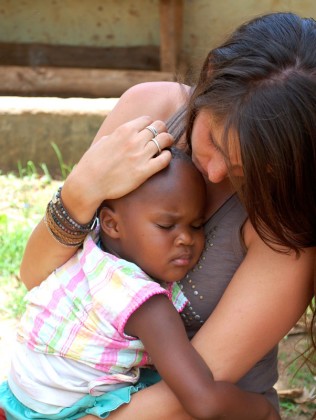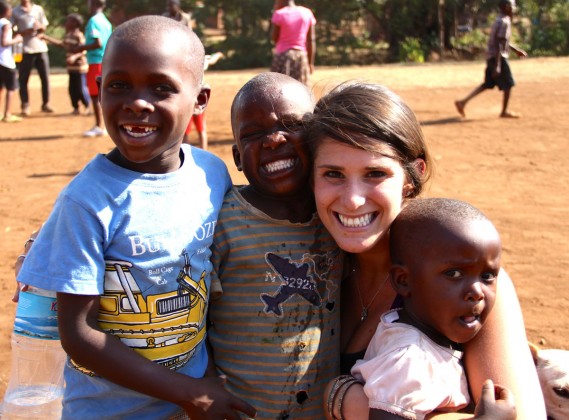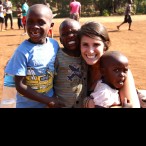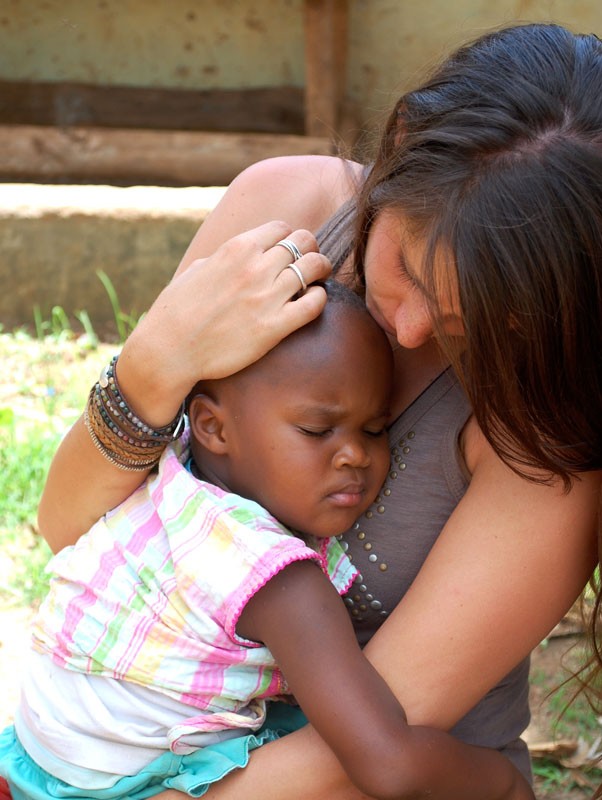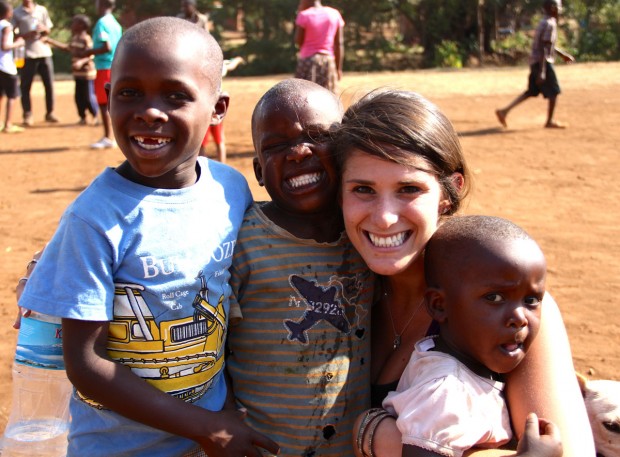Neighbors changing the world

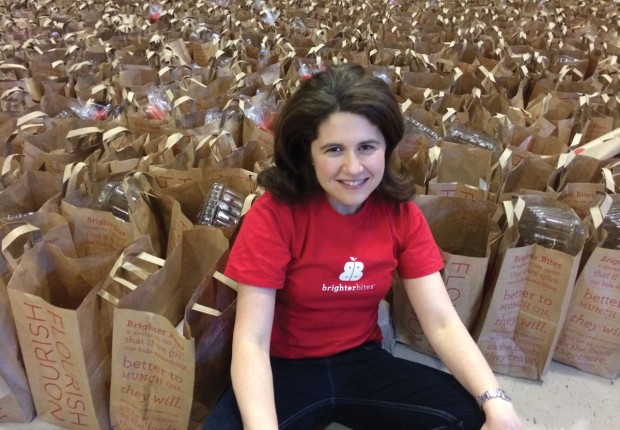
Lisa Helfman sits amidst 550 bags full of fresh Brighter Bites produce ready for students and teachers to take home.
The theory of collective consciousness says we’re all connected, and while we’re all living our own small lives, there’s something bigger going on.
While working individually in their own distinct corners of the world, Lisa Helfman and Mandy Stein are both making big strides toward change. Lisa is director of real estate services at Texas Children’s Hospital and mom of two young boys. Mandy, 22 and a recent University of Texas at Austin graduate, lives across the globe in Tanzania. Both are connecting the dots in inspiring ways.
Lisa Helfman: Fresh produce for everyone
Three years ago, Lisa was a working mom and a runner in good health, but her energy was low. So she decided to cut back on processed foods and join a weekly fruit and vegetable co-op. She thought the fresh produce would inspire better choices for herself and her family, and her hunch was right. Her sons, now 8 and 5, began tasting the swiss chard on their parents’ plates and asking for more apples. Lisa says she knew things had shifted when her son Drew, then 5, looked at a birthday cake and then up at her to ask, “Mama, do I have to eat this?”
Around the same time, she and her husband, Jonathan Adler, a real estate developer, sat at a Texans game, taking stock of the other fans. For the first time, Lisa says, she and Jonathan noticed what everyone was eating, which, of course, was junk. “We thought about what a big change we had made at home, and we wondered how we could make it bigger,” Lisa says. “We thought about the need to change inner city kids’ eating habits and wondered if we could bring what we and our own kids had learned into the schools.”
At the time, Lisa was participating in an American Leadership Forum class where they were discussing ways to effect positive change. Lisa brought her idea, tentatively, to her group. An enthusiastic response led to networking, which led to a conversation with Mike Feinberg, a founder of KIPP (the Knowledge Is Power Program public charter schools). Lisa says he told her in that first meeting that if she could put the program together, she could launch it at KIPP.
More networking ensued, and Lisa eventually enlisted support from the Houston Food Bank (the largest food bank in the country), which offered to be the project’s food distributor, its president taking it on as his personal project. Next, the University of Texas School of Public Health dialed in, adding a teaching component to the program. “I didn’t know what I was doing,” Lisa says. “I just had an idea and connected all the leaders.” With that, she put the building blocks – school, food and nutritional education – in place.
Lisa piloted the project at KIPP Explore, a school in the East End of Houston’s downtown where more than 90 percent qualify for free lunches. She and her small team began distributing produce and educational flyers to 200 families. The response was overwhelmingly positive. Every one of the families who participated in the optional program that first fall semester signed up again in the spring. Today, Lisa oversees the distribution of produce to 2,300 families in 12 schools.
“One third-grade boy told us he’d never had an orange before,” Lisa says. “Now they’re trying all this gorgeous produce, and they’re chasing us asking for kale smoothies!”
In addition to overseeing distribution, Lisa writes grant proposals, resulting thus far in some $3 million funneling in from the State of Texas, Medicaid and Blue Cross Blue Shield. The funding has enabled the project – now dubbed Brighter Bites – to hire three full-time staffers who office at the Food Bank, which incubates the program with office space, equipment and staff benefits. Six researchers at UT work on the project, and six interns rotate through.
Parents at the schools sort and bag the fresh fruits and vegetables, and they’re given handbooks containing weekly nutrition lessons and recipes teaching them how to use the produce. Bags are co-branded with HEB, another sponsor, and soon families will get coupons to help them purchase healthy foods at the grocery store. There’s a PE component as well, with coaches being trained in nutrition and healthy activities for the kids. Dallas schools are next – they also received funding from the state legislature to implement the project – and some foundations are looking to take Brighter Bites national.
Brian Greene, president and CEO of Houston Food Bank, says, “We are excited about the potential scale and replicability of the Brighter Bites model. Houston Food Bank loves to channel our food where it can not only feed people but also have a lasting impact.”
Lisa adds, “We’re supercharging the Food Bank by sending the food out with the impact of education.” Little by little, she says, “We’re changing behavior.”
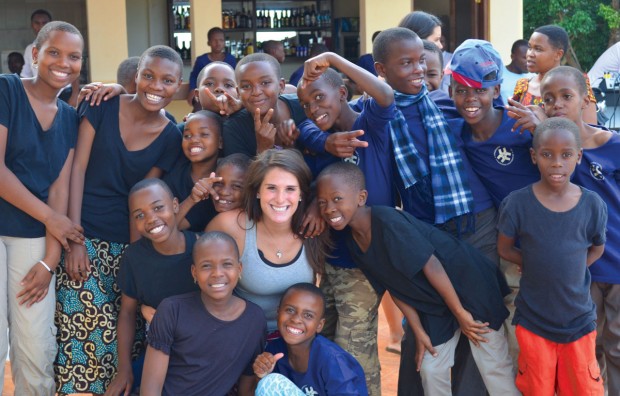
Mandy Stein, surrounded here by the African orphans she supports, named her nonprofit “Neema” International, meaning “grace” in Swahili.
Mandy Stein: From Austin to Africa
While Mandy says there wasn’t “one particular thing” that caused her to move to Africa and work with orphaned children there, a family vacation in Kenya was key to opening her eyes – and her heart – to effecting change halfway across the globe.
“Our family was on a luxurious safari, but our short detour into a Maasai village had a life-changing effect on me,” Mandy writes from Tanzania. “These people lived off the land and had few to no material possessions at all. They were lacking access to medical care and education.” Mandy says when she came home from that trip, she couldn’t stop thinking about the villagers she met and the “hundreds of millions of other individuals around the world who lack access to the same things.”
A few years later, while attending The University of Texas at Austin, Mandy returned to Africa to volunteer and teach in an impoverished, remote village. On her first day in Tanzania, a little boy gave her the name “Neema,” meaning “blessing” or “grace” in Swahili. It was on that trip that she promised the children with whom she was working – the Tuleeni orphans – that she would come back. “Many volunteers make promises to these children, but they very rarely follow through. I am not one to make promises I cannot keep.” So Mandy went back to Africa, again and again, during Christmas and summer breaks from school. This past June, she moved there.
Mandy is now executive director of Neema International, a non-profit organization she founded with the goal of improving the lives of East Africa’s youth. She spends her time working and living with the Tuleeni orphans, named “Tuleeni,” or “care for us” in Swahili, by the orphanage’s founder, an African woman who was once an orphan herself and began taking in children one by one. Most of the children Mandy works with were orphaned when their parents died of HIV/AIDS. She calls herself “a mom, a social worker, a mentor, a teacher.” In the 28 years that the Tuleeni Orphanage has existed, it has never had as many children enrolled in private schools.
“We feel we are on the brink of something great that will help us transform the lives of hundreds of other children in our village,” Mandy says.
Mandy also fundraises and is helping to build a bigger orphanage with a community center/educational facility. The new structure will include classrooms and a community library and computer lab, where people in the Tanzanian village of Uru will have access to educational opportunities promoting a sustainable lifestyle. “These people are stuck in a crushing cycle of poverty that will continue for generations to come, unless someone does something to stop it,” Mandy says.
Family friend and Neema supporter Lesley Robbins says she’s watched Mandy grow up and “always knew what she was doing but never anticipated that she would essentially give everything away to go and help these children. What she’s doing is phenomenal.”
Even at 22, Mandy has volunteered extensively in the States, having served as a mentor, tutor and counselor at “the poorest middle school in Austin, which works on drop-out prevention. These children, just like me, were born in America and dealt a hand of cards,” the Bellaire resident and graduate of The Emery/Weiner School says. “I never understood why I was handed a life filled with education, opportunity and unconditional love, while there were other children who didn’t know where their next meal would come from.”
Mandy recognizes that there is a lot of work to do at home. “The wide variety of people I have worked with [at home] live with hardships and disadvantages, but they are blessed to live in America, where opportunities do exist and resources are available, even if they are difficult to obtain.”
Mandy knows she “may not be able to save everyone’s life. But at the end of the day,” she says, “at least you will be able to say that you were one of the people who went out and tried to do something.”
Want more buzz like this? Sign up for our Morning Buzz emails.
To leave a comment, please log in or create an account with The Buzz Magazines, Disqus, Facebook, or Twitter. Or you may post as a guest.


